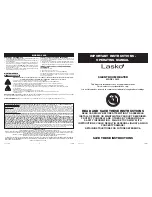
2
Call 1-888-370-6531 for Technical Support
1.2 Safety Hazards
There are potential hazards associated with operation of this or any heater. In addition to the
codes and regulations listed in the following section, general safety rules and the precautions
should be followed at all times to prevent accidents that could lead to personal injury, death, or
property damage. Only those qualified should perform the tasks. Specific safety hazards include:
Electricity: This heater operates on 115V/60Hz electrical power. Turn power off at
the circuit breaker and lock it out prior to performing any work on the heater system or any of the
components. Make sure covers are in place during normal use. Use only copper conductors.
Liquid Fuels: Used oils must be handled properly to prevent spills. Uncontained oil
leaks may contaminate the local water supply. Ensure that all national and local codes are
followed in regards to the requirements for spill containment and SPCC paperwork. Fuel leaks
pose slip/fall hazards, and pose a risk for fires. DO NOT USE GASOLINE OR ANY OIL
CONTAINING GASOLINE. Do not add any cleaning fluids or oil additives to the used oil burned in
this appliance. The use of unauthorized fuels will void the warranty and U.L. listing. See section
1.4 for a list of allowable fuels. The end user of the heater is responsible for ensuring that all
correct precautions are taken in managing their used oil.
Combustion Exhaust Gases: The exhaust products from the combustion are
dangerous to breathe. The heater must be attached to a flue which properly vents the exhaust out
of the building to the atmosphere at all times, to assure safe and proper operation of the burner. If
proper draft cannot be established, changes to the building construction or a draft inducer will be
required in order to provide adequate make-up air.
Safe Maintenance: Used oil contains mineral additives and deposits called “ash”
that will not burn. Ash collects in the heater and flue with regular use over time. Ash must be
cleaned out of the combustion chamber/heat exchanger and flue pipe on a scheduled basis.
Follow the minimum maintenance instructed in section 6. Wear proper protective clothing;
including gloves and face mask or respirator whenever any cleaning is performed, including the
cleaning of the heat exchanger, flue piping and exhaust stack.
Vapor/Dust Ignition: Do not store or use gasoline or other flammable liquids or
vapors near this heater, as they may be ignited by the burner. Do not operate the heater in dusty
or otherwise dangerous environments.
Flammable liquids: Do not create a fire or explosion hazard by using or placing
flammable liquids such as gasoline or solvents near the heater. A flammable liquid is any liquid
that has a closed-cup flash point below 100°F (37.8°C), as determined by the test procedures and
apparatus set forth in 1.7.4 of NFPA 30.
Minimum Clearance – Safe clearance to combustibles (Section 1.6) shall be
adhered to.
Summary of Contents for 81010751
Page 2: ......
Page 41: ...8 Appendices 8 1 Wiring Diagram ...
Page 42: ......
Page 43: ...34 Call 1 888 370 6531 for Technical Support 8 2 Primary Control Instructions ...
Page 44: ...35 Call 1 888 370 6531 for Technical Support Not used with RES 75 kBTU h units ...
Page 45: ...36 Call 1 888 370 6531 for Technical Support No latch up with RES 75 kBTU h units ...
Page 46: ...37 Call 1 888 370 6531 for Technical Support ...








































